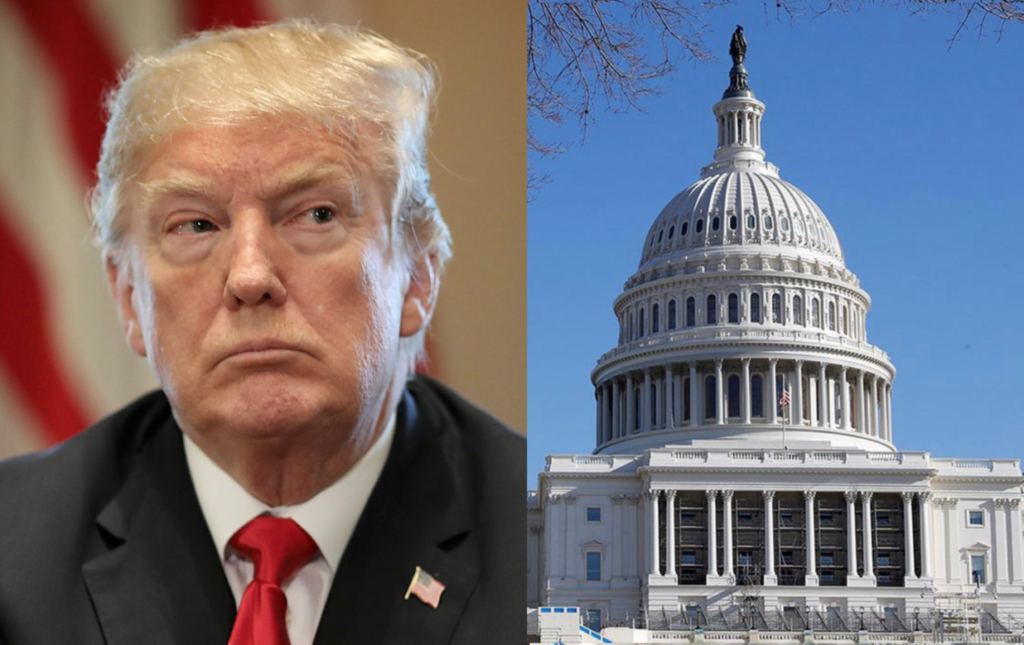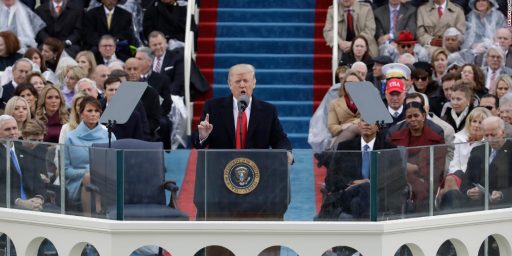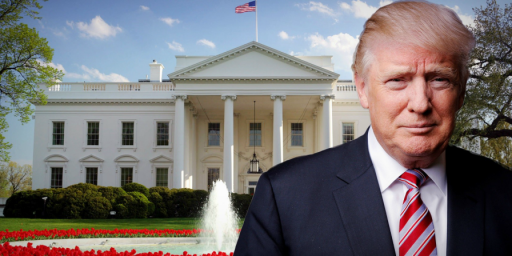Could Losing Congress Actually Help Trump?
The GOP is likely to lose control of the House of Representatives tomorrow, but could this actually help Trump?

As things stand, the conventional wisdom and the polling data both indicate that Republicans will lose control of the House of Representatives in tomorrow’s midterm elections. At least initially, this is likely to be interpreted by analysts and many of Trump’s critics as a rebuke of the President and the Republican Party, and there is certainly some merit in that argument. After all, the President has spent the past month or so telling crowds at his rallies that he is on the ballot even though his name isn’t there and that he needs their support to make sure that the GOP stays in control on Capitol Hill. Over the past week, though, there’s been a noticeable change in Trump’s rhetoric. While he still mentions candidates for the House at his rallies, the rallies themselves are clearly designed to boost the chances of candidates for the Senate and various Governor’s races, and Trump has openly stated that it’s possible that the GOP will lose the House. To some extent this is simply a recognition of reality, but, as two articles published yesterday argue, losing the House could actually be to Trump’s benefit.
First up with that argument is Matt K. Lewis, a conservative who has been a frequent Trump critic, at The Daily Beast:
Consider this: In the post-World War II era, four presidents have lost the House of Representatives during their first midterm election: Harry Truman, Dwight Eisenhower, Bill Clinton, and Barack Obama. All four rebounded to win reelection two years later.
For obvious reasons, people like winning better than losing. Having congressional majorities allows presidents to pass their agendas, which—theoretically—helps them get reelected. What is more (and this is especially apt in the case of Trump’s administration), losing means handing subpoena power to your political opponents. These are not small things. Yet, modern history, as we see above, suggests losing a midterm is far from fatal and is, in fact, probably helpful.
In support of his hypothesis, Lewis cites three factors:
First, winning would create challenges for Democrats. Believing they have a mandate, the party would be tempted to veer leftward and possibly pursue impeachment (falling for the same trap that Newt Gingrich and his Republican colleagues fell for in the late ’90s). On the other hand, if Democrats resist the urge to lurch leftward, they could risk alienating a political base that turned out to vote for them in hopes of enacting a liberal agenda. Regardless of which side prevails, fights would break out over leadership positions (should Pelosi become Speaker again, etc.).
Second, losing the House would allow Trump to (plausibly) spread the blame. Right now, Republicans own everything that happens—or doesn’t happen. That changes the minute Democrats take over the House.
Trump might even take a page from Harry Truman’s playbook. Heading into the 1946 midterm elections, Truman was wildly unpopular, which resulted in Republicans picking up 55 House seats and 12 Senate seats. It was widely believed that Truman would suffer a similar fate in 1948, losing the presidential election. Yet, Truman famously defied the odds by running against the famous “Do-Nothing Congress” and winning reelection.
(…)
Lastly, one of the maxims of the tech industry is to “fail fast.” It is a much better alternative to failing slow. Consider George W. Bush, who defied the odds by actually picking up seats during the 2002 midterm elections, which came in the wake of the 9/11 attacks. Although he went on to (narrowly) win reelection, his second term was a bust; the 2006 midterms swept Democrats back in control of the House, finally forcing Bush to make changes (including replacing Defense Secretary Don Rumsfeld).
I’m not suggesting that a loss on Tuesday will cause an introspective Donald Trump to pivot or “move to the center.” If we have learned anything these last two years, it is that “infrastructure week” is a mirage. I don’t foresee Trump deciding to work across the aisle with “Chuck and Nancy.” He’s much more likely to “give ’em hell” like Harry Truman than he is to “triangulate” like Bill Clinton.
Still, it is entirely possible that a midterm loss would force his administration to make some needed adjustments. And those adjustments might pay off in 2020.
Aaron Blake makes a similar point at The Washington Post:
[I]f you are looking at this purely from the vantage point of Trump’s self-interest — particularly as it relates to winning reelection in 2020 — there is a compelling case to be made that a Democratic House might be a good thing for the president.
The first reason is that voters seem to like divided government. Of the last six presidents to win reelection since World War II, only one had complete control of Congress — George W. Bush in 2004. In 1996, 1988, 1980, 1972, 1968 and 1956, one party controlled all of Congress, but voters picked the other party for the White House.
(…)
The second is that it gives Trump a boogeyman — or, more apt, a boogeywoman. It’s one thing to campaign against House Minority Leader Nancy Pelosi (Calif.) by warning that she could become speaker; it’s another to do so if she is speaker. If Democrats win the House, Trump will have a ready-made foil for his 2020 reelection campaign, even if his Democratic opponent is not such a lightning rod.
Trump could also blame the Democratic House for his continued failures to live up to his many, many promises. (He has already done this to some degree, even though Democrats have no control over any branch of government.) Trump has fulfilled some promises, but key ones and far-fetched ones such as the border wall (not to mention making Mexico pay for it) remain improbable even if Republicans keep control of the House and Senate. If you are going to have gridlock, you might as well have someone on which to blame it who is not in your own party.
And, finally, even that subpoena power could pose some tough choices for Democrats. There will be pressure from the party’s base to go after Trump heard and even impeach him, but we’ve seen how that can lead to overreach — most notably, when Republicans impeached Bill Clinton in the late 1990s. And Democratic leaders have already telegraphed a wariness about that. What happens when they actually have power and the base wants them to go further than they think is prudent? That doesn’t mean they will go too far, but there’s a clear tension.
Lewis and Blake both make valid points. As they both note, history has shown us several occasions when a President has seen his party lose control of one or both houses of Congress in their first midterm only to go on to end up winning re-election two years later. Truman did it in the wake of the 1946 election that saw Republicans win control of the House and Senate for the first time since the Great Depression. Eisenhower did it after Republicans lost control of Congress in 1956, although it’s worth noting that in that case it only took a loss of two seats each in the House and the Senate for the balance of power to shift. Bill Clinton did it after Republicans won control of Congress in one of the most significant midterm elections in American political history. And, of course, Barack Obama did it after his party lost control of the House, and significant ground in the Senate, in the 2010 midterms. Part of the reason for this, it seems clear, is that the fact that the opposition party acquired at least some power in Washington made it easier to attack them while simultaneously taking some of the pressure off the President’s party and gives the incumbent President a tangible thing to run against. This was most apparent, of course, in Truman’s 1948 campaign against what he called the “Do Nothing Congress,” in Clinton’s 1996 campaign against Republicans who had made the strategic error of forcing two government shutdowns during its first year in office, and in Obama’s campaign against Tea Party extremists who took the nation to the edge of fiscal disaster over raising the debt ceiling in 2011. Theoretically at least, a President Trump running for re-election in 2020 could find similar success, although of course its likely that he would attack Democrats just as thoroughly even if they didn’t have control of the House.
All of that notwithstanding, though, it strikes me that the situation that President Trump is likely to face in 2020 has the potential to be markedly different from what his predecessors faced when they stood for re-election. Perhaps the most important difference is the fact that, unlike any of these predecessors except, to some extent, Bill Clinton, Trump is likely to be the subject of multiple investigations heading into 2020 in the event that Democrats capture the House tomorrow. This wil include not only the likely reopening of the Russia investigation by a Democratic-controlled House Intelligence Committee but also investigations into the Emoluments Clause issues raised by his continued interest in The Trump Organization as well as investigations of members of his cabinet over allegations that have been widely reported over the past year and a half. This is just as likely to put the Administration on the defensive as it is to give him the President ammunition with which to attack the Democrats and their nominee for President.
Additionally, the extent to which Trump will be able to use a Democratic House as a cudgel will depend significantly on how Democrats conduct themselves if they gain power. If they take the route that many of their more radical base supporters want and spend the next two years doing very little other than investigating Trump and perhaps pursuing impeachment charges, then they could very well give Trump what he needs to use Congress to advantage. On the other hand, if they use their control of Congress to pursue an agenda that lays the groundwork for 2020 by passing legislation that, even though it would be doomed in the Senate due either to Republican control or the relentless use of the legislative filibuster, is popular with the public then that could end up blunting Trump’s efforts to turn Democrat’s control of Congress against them.
Despite those caveats, the scenario that Lewis and Blake put forward is certainly possible and, as we’ve seen from history, it’s one that has worked before and could very well work again. In that same respect, it’s worth keeping in mind that the odds are nearly always in favor of an incumbent President getting re-elected absent the existence of extraordinary circumstances such as the economic downturns that Presidents Hoover, Carter, and George H.W. Bush faced at the end of their first and only term in office or the massive public dissatisfaction with the Vietnam War that Lyndon Johnson faced when he decided to end his bid to run for a second full term in 1968. Absent such circumstances, history in the modern era since the end of World War II has shown that it’s more likely than not that a sitting President will be re-elected. In Trump’s case, the biggest risk for the moment would appear to be a recession, which we are arguably overdue for given how long economic expansions have historically been since the end of World War Two. In that case, his re-election prospects could end up being grim indeed regardless of who controls Congress after tomorrow.






It’s funny that you mention this, as I was just arguing with my co-worker. At this point he’d prefer the Republicans to control all three branches for the next 10 years, which should make the blame obvious when everything goes to shit.
I admit he’s got a point. They’ve put a bunch of time bombs in the budget and we don’t want to be anywhere near them when they explode.
Nah. First, that sounds like what someone would say after they lost. Second, and more importantly by controlling the House, some congressional oversight and investigation of Trump and his cabinet can actually happen. Third, the Democrats can put together some good legislative initiatives and, when they are shot down in the Senate or vetoed, there is still blame to be placed on Trump and his party.
I caught a little bit of the HBO version of Pod Save America, where they did this bit where they asked what the Dems would do if they retook the House. They listed off a good dozen or so things, the punch line being something like “M) All of the above.” It was like they were trying to convince themselves that they had this big expansive agenda. But it was all just one thing: Get Trump.
What else are they gonna do?
El Cheeto is not going to take any responsibility for any results unfavorable to the GOP. That’s a given. He already blames Democrats for all the GOP’s legislative failures. I recall after one of the various attempts to repeal ACA fizzled in the Senate, he raved about the fact that not one single Democrat voted for it (after they were shut off the process, which BTW, El Dennison did not mention).
Obviously he will blame everything that goes wrong on the Democrats if they win the House. If they compromise and cooperate with the GOP to pass legislation, El Cheeto will boast about having passed this or that law in spite of strong Democratic opposition, you’ll see if he doesn’t. And his base will eat it up.
Another factor that has kept presidents to one term, is when they face a challenge within their party during the primaries. The problem in this scenario, is the challenger tends to be more to the left or right of the incumbent. I’m sure we don’t want to see that in the GOP.
The hope is Trump has a very low approval rating, especially given the economy. If it goes south, his base may stick with him, but others won’t. So given a Democratic opponent who doesn’t serve as a convenient target for El Cheeto, we can hope for a Trump loss in 2020.
I think he and his senior people are terrified of losing the House. If the Dems control the House and have subpoena power all bets are off. they can drag Bannon and Stone and all the other bad actors in and when they refuse to answer questions it will be a little different than when Nunes was in charge. With Nunes they stonewalled and the Republicans said thank you and here’s your parting gifts. If the Dems win the House they can charge them with contempt. Bannon and Stone are bullies, they’ll fold like a cheap suit if threatened with prison.
@James Pearce: I tire of your comments because they are consist only of criticisms of democrats. You apparently didn’t view the video you reference because that segment included a number of specific proposals that were more than “get Trump.” Of course, you probably believe that preventing Trump from gutting Social Security and Medicare to be getting Trump.
Republicans were ALWAYS going to blame Democrats no matter what happens. For god’s sake, they’ve had complete control for 2 years and STILL blame Dems for “obstruction”. There isn’t any point in the near future where the GOP goes “huh, our bad” and accepts responsibility for ANYTHING even remotely negative.
If Dems are going to get dumped on no matter what, then why not have the power to try and stop some things if they can? Better to be blamed but the ability to fight back then be powerless and sh^t on constantly to boot…..
@dmichael:
(Regular readers of this comment section should go ahead and skip this, since you no doubt know what I’m going to say.) Normally I don’t respond directly to the Trumpers, because they are effectively just mindless Trolls and obviously so. The one Trumper I make exception for is Pearce. (FTR, he denies he is a Trumper, but his positions are 100% aligned with the crazy frothing at the mouth contingent we have here, but just couched in language that makes it seem like he has sad regret over all this.) I’m fairly certain he falls into the “moderately clever Trumper” camp, wherein his posts are intended to sow little seeds of doubt in peoples minds. He blames the Democrats for everything, encourages us not to focus on the trivialities like Roy Moore, or the Russian investigation, or the things that Trump actually says and does. And he helpfully throws in a “But what about Hillary” at every opportunity.
Follow up question by Matt Lewis:
Could these tasty grapes be sour for the Democrats after all?
Let’s remember back to the Obama years, painful as that is. After the GOP took the house did that stop Obama in his tracks? No. Even after the GOP took control of both house and senate, Obama defiantly proclaimed “I have a phone and pen.” Well, so does Trump and he hasn’t been afraid to use either of them.
“This Tuesday America takes an IQ test. Or perhaps we should say a common sense test. Or even more a test to see the degree to which it has been brainwashed.
This test has been going on for a week or two now in early voting in rather large numbers, but the results will be in, for the most part, late Tuesday night.
You would think that with all economic indicators at or near an all-time high, unemployment at an all-time low (notably for minorities and women), wages rising as they haven’t in years, the country at peace with the threat of evil doers from ISIS to North Korea on the wane, and an incredible, indeed unprecedented, number of presidential accomplishments in 20 months this election would be the proverbial no-brainer for voters.”
https://pjmedia.com/rogerlsimon/tuesday-america-takes-an-iq-test/
@Jake:
C’mon. Seriously?
Job growth has slowed under Dennison. More jobs were created in Obama’s last 21 months than in Dennison’s first 21 months. 423,000 more…in other words, as of right now, it would take Dennison two extra months just to catch up.
Unemployment, for women and minorities, is simply following a long term trend.
Wages are rising…OK…that is inevitable as the job market tightens. In any case wage increases are being offset by rapid inflation…largely due to tariffs. The national average for gas is up over $0.50 a gallon since Dennison took office, and just wait until you see what happens to gas prices as Iranian sanctions are re-instated this week.
If anything Dennison only deserves a little bit of credit for not fvcking up what he inherited from Obama…a claim he can’t make for the $400M+ that he inherited from his Daddy.
Finally…ISIS and NOKO are not on the wane. They are certainly far, far, far more dangerous than your Dear Leader’s ghost caravan.
PS…If you want to have a fact based discussion…do not start with PJ Media.
@Whoopie: Sort of related, but isn’t it curious how people who are against “legislating from the bench” are only sometimes concerned with “legislating from the Oval Office”? Maybe I failed civics class, but I think the only legislative responsibility delegated to the executive branch of our government is the choice to sign or veto bills.
@Jake:
Dennison said, this weekend that if Abrams is elected in Georgia she will do away with the 2nd Amendment. Tell me how a Governor of one state is going to overturn the 2nd Amendment?
Face it, Jake…Dennison knows his supporters can’t do very well on IQ tests…that’s his entire business model. Now that I think of it…it’s the entire Republican party’s business model.
@Whoopie:
Correct. What makes his use stand out is that to date, Trump has issued more Executive Orders than any of his predecessors. And that’s with control of both chambers of Congress. If present behavior is anything to judge by, this will only increase with a divided Congress providing cover.
Which again, calls into question Conservative’s attacks on Obama for ruling by fiat. But that’s nothing new.
@mattbernius:
Edited for accuracy…
Apologies for any confusion…
Short answer: hell, no it won’t help Trump.
Reality is that a Dem-controlled House will allow for subpoena powers and actual substantive hearings – and Trump and his administration have a lot to fear from sunlight.
@SKI:
Every fascist leadership has been corrupt to the core. It didn’t matter then and won’t matter now.
Does suppeona power help a lot if suppeonas for documents are ignored, and the people (if they show up at all) lie?
And, if people lie under oath in front of a House panel, would there be any recourse beyond referring the matter to the justice department that will not prosecute?
This seems at least as likely a scenario as the Democrats overreaching and moving to impeachment.
Personally, I’d rather wait till Tuesday before we start analyzing what it means for 2020.
That said, it is true that people have had a tendency to write off past president’s reelection chances after a bad midterm. They did it for Obama in 2010. They did it for Clinton in 1994. They even did it for Reagan in 1982 (where the GOP didn’t lose the House, they didn’t have it to begin with, but they lost 26 more seats).
The real question I’d have for Trump’s reelection chances isn’t what happens on Tuesday, but rather this: Can he expand on the support he received in 2016? Most presidents who have won reelection did better the second time around than their initial election. Obama was a big exception; however, his 2008 victory was so massive that he could afford to lose quite a bit of it and still retain a popular and electoral majority. Trump, in contrast, pretty much can’t afford to lose anything from what he won in 2016. In theory, he could lose two of the three states of WI, MI, and PA while still retaining an electoral majority, as long as he keeps everything else. But given that he won all three states by razor-thin margins, and they all depended on the same demographic tendencies, that seems highly unlikely to happen, and it’s not something he can count on (or even the Russians can count on).
Now, presidents sometimes lose some states while gaining others; Clinton and Dubya both did. For instance, Bush won NH the first time, lost it the second but gained Iowa and New Mexico. Something like that conceivably could happen with Trump, especially since there were several states he lost only by narrow margins (NH, MN, NV, ME). One way or another, though, he has to expand on his support, and most likely without having a historically unpopular opponent.
Two years is an eternity in politics, but I’m guessing 2020 will fall back into more typical partisan patterns, as he seems to have gained some support from conservatives who were previously reluctant to support him, while losing a lot of the “What the hell?” voters who chose to roll the dice for him or thought he’d be more liberal.
@Kylopod:
Hear Hear. Dead on.
Since 2009, Republicans have paid absolutely no electoral price whatsoever for their malpractice and malevolent behavior. Until the votes are counted I continue to believe that The House may very well stay Republican.
@Kylopod:
The latest polls are interesting, even if the chickens are yet to hatch. The latest at Real Clear Politics forecasts no net pickups in the Senate for the GOP. this isn’t good, but it’s perhaps the best the Democrats can expect.
I’d rather not speculate. But I can’t resist this once: If the Senate were to end up 50-50, who’d change parties?
@Kathy: I certainly would prefer that the Dems capture the Senate, but relative to the expectations right now a 50-50 Senate would be nice. From my understanding, the GOP technically would have more votes, due to Pence as the tie-breaker. But committees would be equally divided between the parties (that’s what happened in 2000), and things could get interesting because in theory Dems (if they stay united) could prevent something from coming to the floor.
Anything is possible, Doug; however, all this is conjecture, based on a single premise: that Trump is a rational actor. All indicators and repeated performances show this not to be the case. If the Dems take the House and begin/ reopen investigations, recent history shows Trump will revert to his instincts, and return to his signature histrionic siege mentality. It may be abated for now by other front-page news, but that “they’re out to get me!” paranoia is going to be back on the front burner for all to witness.
No, Dems taking the House will not benefit Trump, because Trump is Trump.
@Kylopod:
My memory says in 2000 a Republican Senator switched parties, giving a majority to the Democrats.
This time, well, I don’t think the purpose is ever just to irritate the other side. But if that were to happen this time (and Democrats would forgive Collins and/or Murkowski if they switched), the tantrum Trump would throw would be reason enough.
@Kathy: Senator Jim Jeffords is whom you are thinking of; he dropped his R-party affiliation and became officially an independent and caucused with the Dems. My good friends who are proudly members of the Democrats in Grainger County, TN — where there are approx. 12 other Dems — put up a homemade yard sign thanking him.
@Kathy:
That actually wasn’t what I was alluding to; I was simply talking about what a 50-50 Senate entails in practice, and that was the situation at the start of 2001 for a few months, until Jim Jeffords left the GOP and became an independent caucusing with the Dems, giving them a 51-seat majority.
The only two Senators I could even in theory imagine being potential switchers are Joe Manchin and Lisa Murkowski, and even those are long-shots in my opinion. Angus King has said he might be open to caucusing with the GOP in the future, but I don’t believe him. I don’t think he has the slightest in common with today’s GOP.
Also, things don’t always go so well for such folks. The last Senator to switch was Arlen Specter, who became a Democrat in 2009 then went on to lose the Democratic primary the following year, and then the seat was picked up by a Republican.
1-) The Democrats can request Trump’s tax returns if they get the majority in the House.
2-) If the Democrats get the majority in the Senate they can block anyone with any connection to the Federalist Society from entering a Federal Courthouse.
3-) Pelosi nor Schumer wouldn’t be idiotic to try to impeach Trump. You could see a backbencher that calls himself or herself a Democratic Socialist introducing articles of impeachment, but then that would go nowhere.
Pelosi did not try to impeach Bush in 2006(I remember commenting with an American couple in a churrascaria in São Paulo in 2007 that impeaching Bush would be a bad idea).
4-) The only way that losing the House would help Trump is that he could ignore the Kentuckian Turtle and whoever is the Minority Leader of the House and then work with “Chuck and Nancy”. For everything else it would be a loser.
5-) The House and the Senate matters. We would have someone more liberal than Garland succeeding Antonin Scalia and no one from the Federalist Society being considered to any Federal Court if the Democrats had managed to keep the Senate in 2014 and then 2016.
I don’t know if it helps Trump politically. However, if by chance Democrats capture the Senate as well as the House I wouldn’t be surprised to see Donald Trump suddenly rediscover some of his Democratic DNA as a way to try to survive.
In other words, a few percentage points difference in a couple of Senate races could have a profound effect on how this country is governed for the next two years.
This reminds me of a similar piece recently put out by Matthew Continetti, also on the Daily Beast…it’s so nice to see all of this Republican/conservative concern trolling saying that the Democrats will lose by actually winning control of the House…these oh so concerned commentators are best ignored, as I’m sure they think that there is nothing the Democrats can do to actually win anything…
@Kylopod:
Not with the center so powerless.
In this case, though, if a senator were to hand control to the Democrats, they’d be the hero who saves the country from Trump, however badly their career does afterwards.
Around here the ballot is still dominated by Democrats and many voters here are still registered Democrats*. A sprinking of Republicans here and there. Many of the Democrats are unopposed. These Democrats are more conservative than many of the Republicans. Nancy Pelosi? “Who’s that ?” would be their answer in their disavowal of the national Democrat party leaders and platforms.
Some day the national party will return to sensible ideas and values.
* Probably due to lingering effects and resentments of the “Reconstruction” . And General Sherman.
No one so far has mentioned that a successful day for Dems would do wonders for Mr Mueller’s job security. So there’s that.
@Tyrell: Yeah, I know what you mean. I can’t wait until the National party starts supporting lynchings, bigotry, homelessness, and shifting the tax burden to the poor again either.